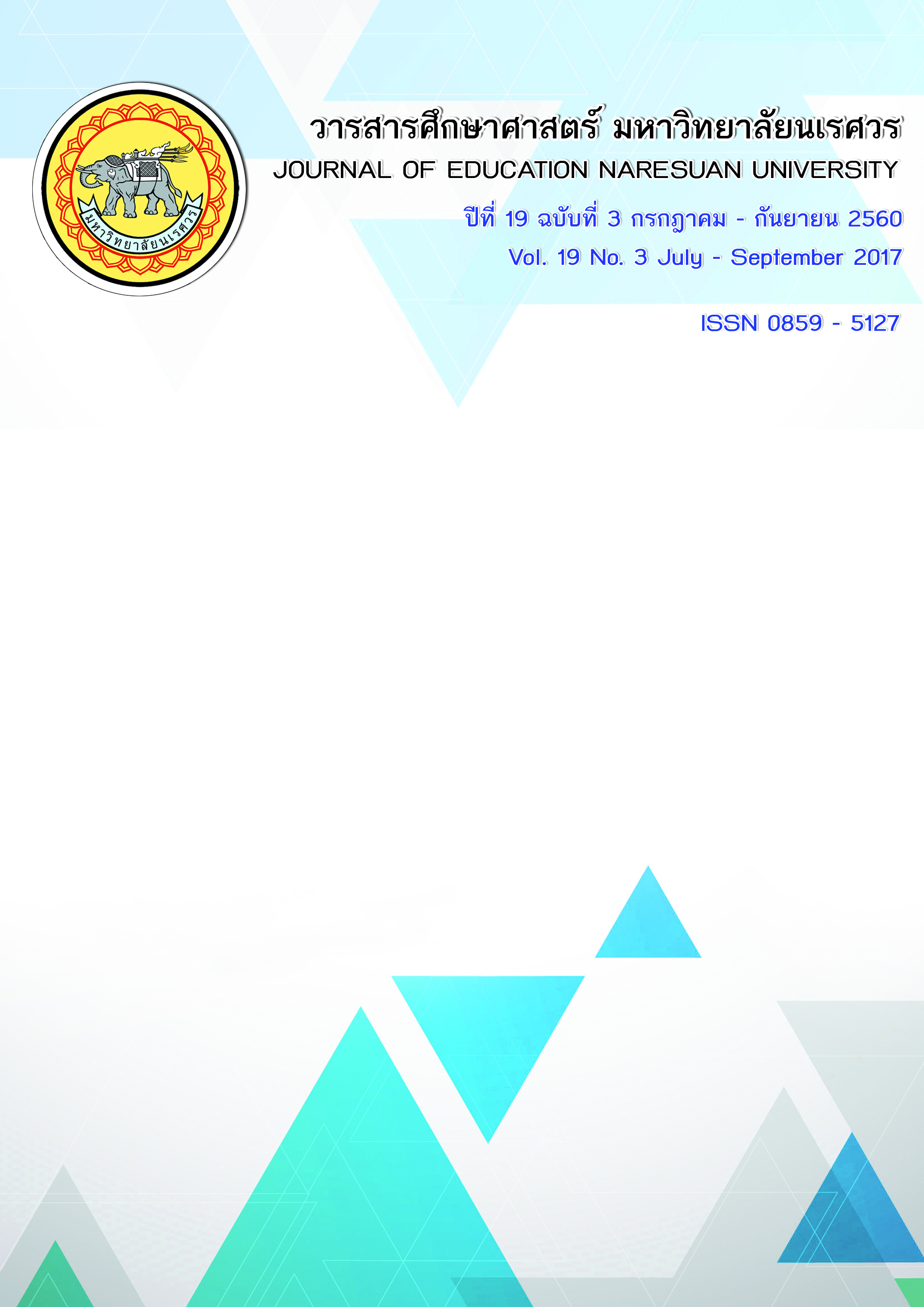การเปรียบเทียบผลสัมฤทธิ์ทางการเรียน ความสามารถในการแก้ปัญหาทางคณิตศาสตร์และเจตคติต่อคณิตศาสตร์ของนักเรียนชั้นประถมศึกษาปีที่ 6 ระหว่างการจัดการเรียนรู้โดยใช้กระบวนการแก้ปัญหาตามแนวคิดของ Polya ร่วมกับการเรียนรู้แบบร่วมมือโดยใช้เทคนิค STAD
Main Article Content
Abstract
การวิจัยครั้งนี้มีวัตถุประสงค์เพื่อเปรียบเทียบผลสัมฤทธิ์ทางการเรียน ความสามารถในการแก้ปัญหาทางคณิตศาสตร์และเจตคติต่อคณิตศาสตร์ของนักเรียนชั้นประถมศึกษาปีที่ 6 ระหว่างการจัดการเรียนรู้โดยใช้กระบวนการแก้ปัญหาตามแนวคิดของ Polya ร่วมกับการเรียนรู้แบบร่วมมือโดยใช้เทคนิค STAD กับการจัดการเรียนรู้แบบปกติ กลุ่มตัวอย่าง คือ นักเรียนชั้นประถมศึกษาปีที่ 6 โรงเรียนสาธิต “พิบูลบำเพ็ญ” มหาวิทยาลัยบูรพา จังหวัดชลบุรี ที่กำลังศึกษาอยู่ในภาคเรียนที่ 2 ปีการศึกษา 2558 จำนวน 2 ห้องเรียน รวมจำนวน 62 คน เครื่องมือที่ใช้ในการวิจัย ได้แก่ แผนการจัดการเรียนรู้โดยใช้กระบวนการแก้ปัญหาตามแนวคิดของ Polya ร่วมกับการเรียนรู้แบบร่วมมือโดยใช้เทคนิค STAD แผนการจัดการเรียนรู้แบบปกติ แบบทดสอบวัดผลสัมฤทธิ์ทางการเรียนวิชาคณิตศาสตร์แบบวัดความสามารถในการแก้ปัญหาทางคณิตศาสตร์ และแบบวัดเจตคติต่อคณิตศาสตร์ วิเคราะห์ข้อมูลโดยใช้การทดสอบค่าสถิติ t
แบบ t – Independent และการทดสอบค่าสถิติ t แบบ t – Dependent ผลการวิจัยพบว่า นักเรียนกลุ่มที่ได้รับการจัดการเรียนรู้โดยใช้กระบวนการแก้ปัญหาตามแนวคิดของ Polya ร่วมกับการเรียนรู้แบบร่วมมือโดยใช้เทคนิค STAD มีผลสัมฤทธิ์ทางการเรียนวิชาคณิตศาสตร์และความสามารถในการแก้ปัญหาทางคณิตศาสตร์หลังการจัดการเรียนรู้สูงกว่าก่อนการจัดการเรียนรู้ อย่างมีนัยสำคัญทางสถิติที่ระดับ .05 และพบว่านักเรียนกลุ่มที่ได้รับการจัดการเรียนรู้โดยใช้กระบวนการแก้ปัญหาตามแนวคิดของ Polya ร่วมกับการเรียนรู้แบบร่วมมือโดยใช้เทคนิค STAD มีผลสัมฤทธิ์ทางการเรียนวิชาคณิตศาสตร์ ความสามารถในการแก้ปัญหาทางคณิตศาสตร์และเจตคติต่อคณิตศาสตร์สูงกว่ากลุ่มที่ได้รับการจัดการเรียนรู้แบบปกติ อย่างมีนัยสำคัญทางสถิติที่ระดับ .05
THE COMPARISON OF LEARNING ACHIEVEMENT, MATHEMATICAL PROBLEM SOLVING ABILITY AND ATTITUDE TOWARD MATHEMATICS OF GRADE 6 STUDENTS BETWEEN USING THE POLYA’S PROBLEM SOLVING PROCESS WITH
THE COOPERATIVE LEARNING STAD TECHNIQUE AND THE REGULAR TEACHING APPROACH
The purposes of this research were to compare of Mathematical learning achievement and Mathematical problem solving ability as well as attitude toward Mathematics of Grade
6 students between using the Polya’s problem solving process with the cooperative leaning STAD technique and the regular teaching approach. The sample consisted of 62 students in Grade 6 in academic year 2015 at Piboonbumpen Demonstration School, Burapha University, Chonburi Province, using purposive sampling. The research instruments were lesson plan, Mathematical learning achievement test, Mathematical problem solving ability test and attitude toward Mathematics Test. The data were analyzed by mean, standard deviation,
t – test for dependent samples and t – test for independent samples. The results showed the learning achievement and The Mathematical problem solving ability of the student learned using the Polya’s problem solving process with the cooperative leaning STAD Technique was after learning higher than before learning at the .05 level of significance. And showed The learning achievement, The Mathematical problem solving ability and The attitude toward Mathematics of the students learned using the Polya’s problem solving process with the cooperative leaning STAD technique was higher than that of the students learned using the regular teaching approach Learning at the .05 level of significance.
Article Details
The owner of the article does not copy or violate any of its copyright. If any copyright infringement occurs or prosecution, in any case, the Editorial Board is not involved in all the rights to the owner of the article to be performed.


